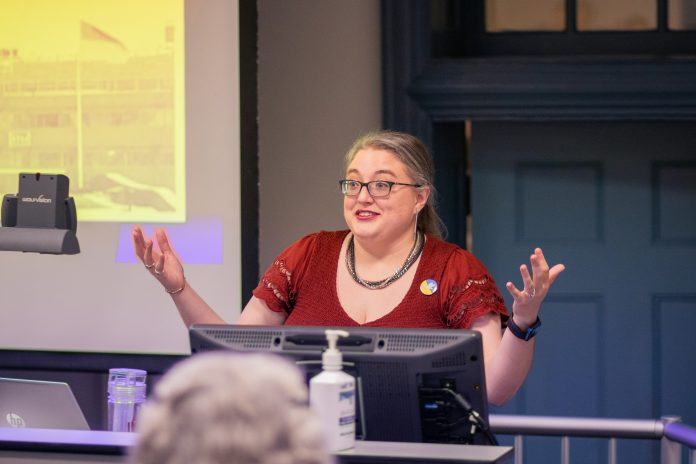The following article was previously published on The Flat Hat’s website during the week of Oct. 23. However, due to an unforeseen technological glitch, it was removed from the website for a period of time and was re-uploaded today, Nov. 6.
Friday, Oct. 20, the Department of Russian and Post-Soviet Studies at the College of William and Mary hosted guest alumna Kimberley Cossley ’04 to discuss her work studying Finnish-Russian history and international education.
Since graduating from the College in 2004, Cossley has worked in various positions across the field of international education, including as an Immigration Advisor at Virginia Tech and as a graduate assistant at the Center for Global Education at Old Dominion University. Currently, Cossley is a Ph.D. candidate at ODU, researching virtual study abroad at community colleges during the COVID-19 pandemic and analyzing interactions between local and state governments during the pandemic.
Cossley began her talk by introducing the concept of international education, which she emphasized is more than just study abroad programs. International education encompasses the field of international enrollment management, which includes professionals, like Cossley, who advise and assist international students to gain the proper credentials, visas and immigration status to study and work in the United States.
While working to earn her Ph.D., Cossley shared that she had the opportunity to visit Finland, where she explored the Lenin Museum in the city of Tampere. The museum is dedicated to the life and work of Soviet leader Vladimir Lenin, but also explores the connection between Russia and Finland.
After the Russian Empire occupied Finland, the Russian Empire initially allowed Finland to keep many of the Finnish systems in place, like its Parliament, and maintain Finnish as the primary language in schools. However, from 1899 to 1900, Cossley said, the process of “Russification” began, in which the Russian government dismantled the Parliament and introduced “the Language Manifesto of 1900”, which stated that Russian would be made the primary language of administration and education in the country.
“I wanted to share not just the Finnish story of student unions, but also talk about different paths through international education. Learning a language doesn’t mean you have to be a translator for your entire life. You know, you have so many things you can do,” Cossley said.
Through her trip to Finland and her experience studying Finnish history and culture, Cossley noted in the talk that the Finnish language was essential to their international identity. The language acted as a window into Finnish culture, in reaction to the trend of “Russification.”
She also touched on the current prominence of the Finnish Student Union, an organization dedicated to advocating for university students in Finland. Cossley noted that the Student Union has played a significant role in guaranteeing free university for Finnish students and currently is leading the fight to maintain Finnish as the primary language of instruction in Finnish universities, instead of English.
“I hope students realize that they have a role to play in what is taught at universities,” Cossley said. “I want students to understand that language is not just words on paper, but it is a narrative.”
Cossley tied the story of Finland and the significance of their language on their culture to the trend of downsizing or removing foreign language programs in universities across the country. Cossley noted that West Virginia University eradicated their language department last year.
While student protests at WVU led to the reinstatement of Spanish and Chinese instruction, Cossley believes that taking away the opportunity to pursue language studies implicitly demonstrates that the stories of non-English speaking cultures are not worth learning.
Shutting down language programs at universities also has the unintended consequence of diminishing the field of international education. Cossley pointed out that without instruction in different languages, when students look to travel or study abroad without proficiencies in foreign languages, it becomes more difficult to make these dreams a possibility.
Aidan McCullough ’25 attended Cossley’s talk and noted that his biggest takeaway was the importance of maintaining international education through language teaching.
“It builds up empathy, cultural empathy, cross-cultural interaction, intersectionality and classroom setting and dialogue between people,” McCullough said. “I think it’s very valuable and important, and should not be defunded and should be encouraged.”
Ian Matthews ’25 said that the Russian language program at the College has been very important to him. As with McCullough, he worries about the downsizing of language programs in universities, including at the College.
“With last year you saw the removal of the German language major,” Matthews said. “And I think this is a somewhat worrying trend within the language department. The takeaways of this lecture, of course, is definitely fund these foreign language programs, fund these international programs, and, don’t leave them behind in the preference for STEM.”

